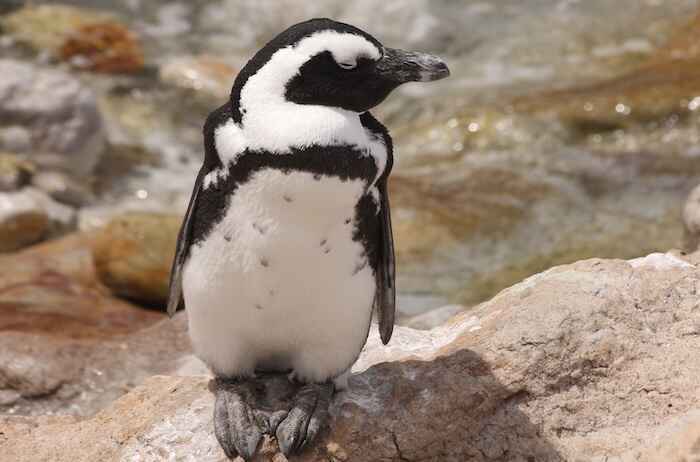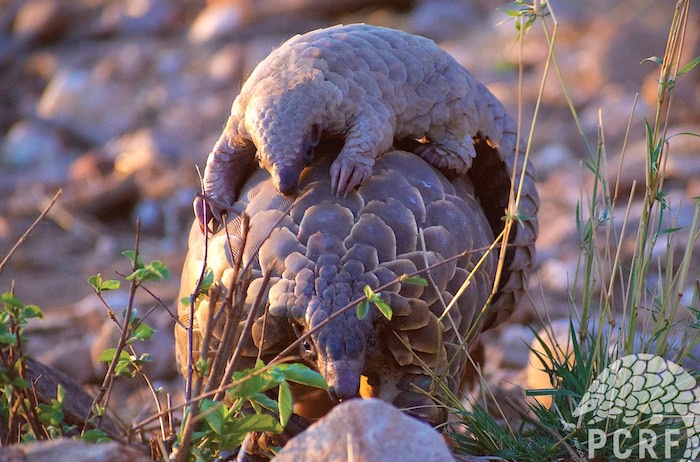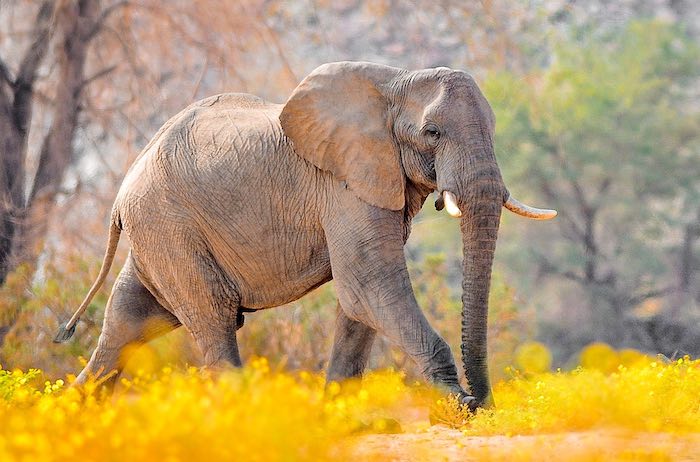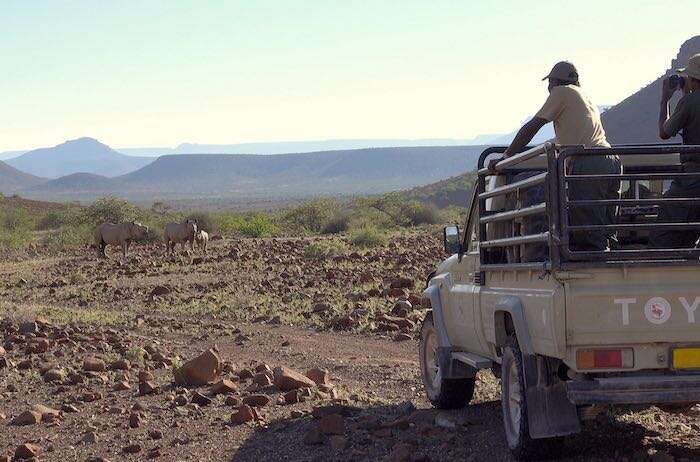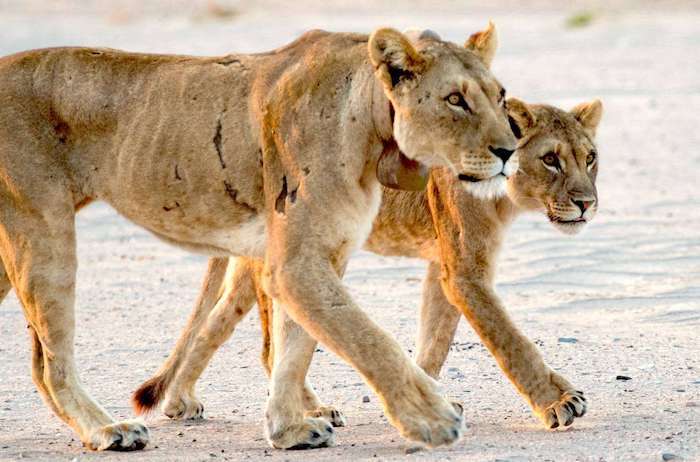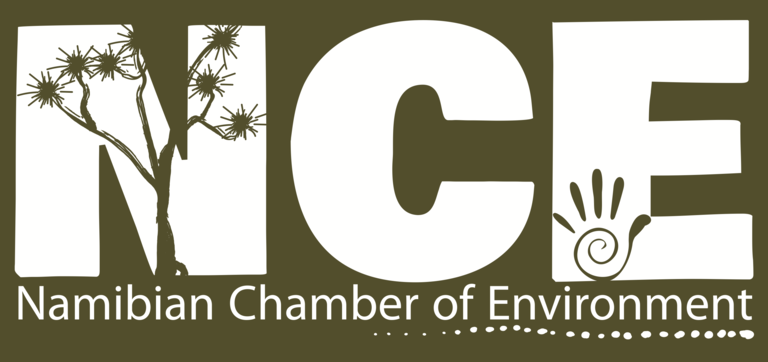
How Namibia is Outsmarting Criminals Involved in the Illegal Wildlife Trade
By Gail C. Potgieter
9th August 2019
Serious crimes are being committed in Namibia – crimes against our precious wildlife, our natural heritage and, ultimately, our people. The criminal syndicates behind poaching are highly organised, professional and very clever. They are growing rich by stealing Namibia’s natural heritage, using poor Namibians to do their dirty work for them in return for less than 10% of the product’s market value. Those poaching on the ground thus bear all the risks associated with illegal activities, yet see precious little of the profit.
It is time to turn the tables on the illegal wildlife trade syndicates, and Namibia is doing just that. To combat this type of organised crime we need to be even more organised, professional and smarter than these shadowy syndicates. Doing this requires collaboration, funding and an unwavering commitment to stop poaching and trafficking, which is a different goal to just catching poachers. Whereas catching poachers is part of the job, in reality they are viewed as entirely expendable by their criminal bosses and can be easily replaced with others willing to do the same dirty work. Stopping poaching and trafficking, however, requires a smart, strategic approach that goes beyond the poachers on the ground and uses ‘weapons’ that are far more effective than guns.
Namibia’s first weapon is collaboration both within the country and with those who tackle illegal wildlife trade in neighbouring countries. Operation Blue Rhino in Namibia is a joint initiative between the Protected Resources Division of the Namibian Police Force (NAMPOL) and the Intelligence Investigation Unit (IIU) of the Ministry of Environment and Tourism (MET). This team includes police officers who were selected from different divisions and regions, and MET officers from the IIU and the regional offices. Blue Rhino also works with the Namibian Defence Force, Save the Rhino Trust and their colleagues in Botswana and Zambia.
Using their collaborative network and funding from a few key donors who understand their operational needs, Blue Rhino has achieved enormous success in just the first six months. From July to December 2018 they arrested 88 suspects, opened 37 new dockets in the courts and confiscated 30 wildlife parts including three rhino horns, eight elephant tusks and 12 pangolin skins. Five live pangolins were also confiscated and released back into the wild. The extent of their success is not fully revealed by these impressive statistics, however, as they have disrupted illegal wildlife trade and started to dismantle a number of criminal syndicates. This sends a severe warning to other syndicates that still operate in the country. In some cases they have even managed to arrest poachers before rhinos or elephants were killed; this is a direct result of the significant investment Blue Rhino have made in intelligence gathering and analysis.
There are a number of poaching incidents for which no one was ever arrested or charged. With this new collaborative effort and focus, these former weaknesses are being addressed by employing another weapon in Namibia’s armoury – effective investigation through the strategic deployment of resources. Effective investigation is based on collecting and analysing hard evidence which can be used to build solid prosecutorial cases against suspects.
Arresting poaching suspects is only the start of a long legal process that includes building a case, presenting dockets to prosecutors, going through bail application hearings, prosecution and finally sentencing those found guilty. In the past, prosecutors and magistrates were not fully informed of the seriousness of wildlife crime, which allowed people to get bail and disappear, or to receive lenient fines and sentences. The MET has responded by developing a handbook for evaluating and prosecuting crimes in Namibia, which is intended for investigators and prosecutors who are now working closely together on wildlife crime dockets, based on a shared sense of purpose and vision.
In 2017 Namibia primed another weapon in its armoury by increasing the legal penalties for illegal wildlife trafficking. Today, anyone caught with rhino horn, elephant ivory, pangolin scales or other controlled wildlife parts can be fined up to N$15 million or imprisoned for up to 15 years, or both. Those caught trying to buy or sell these parts, both locally and for export, can be fined up to N$25 million, be imprisoned for up to 25 years, or both.
State prosecutors will vigorously oppose bail for foreign nationals arrested for wildlife crime, and those found guilty will be deported once they have paid their fines or served their prison sentences. The state also opposes bail for Namibian suspects who are flight risks, may interfere with investigations or are likely to offend again. These maximum sentences are aimed at the high level criminals who ultimately drive the poaching activities. Such criminals are far more difficult to catch than the low-level poacher or product transporter, and once they are caught we need to ensure that the sentence truly reflects the seriousness of their crimes.
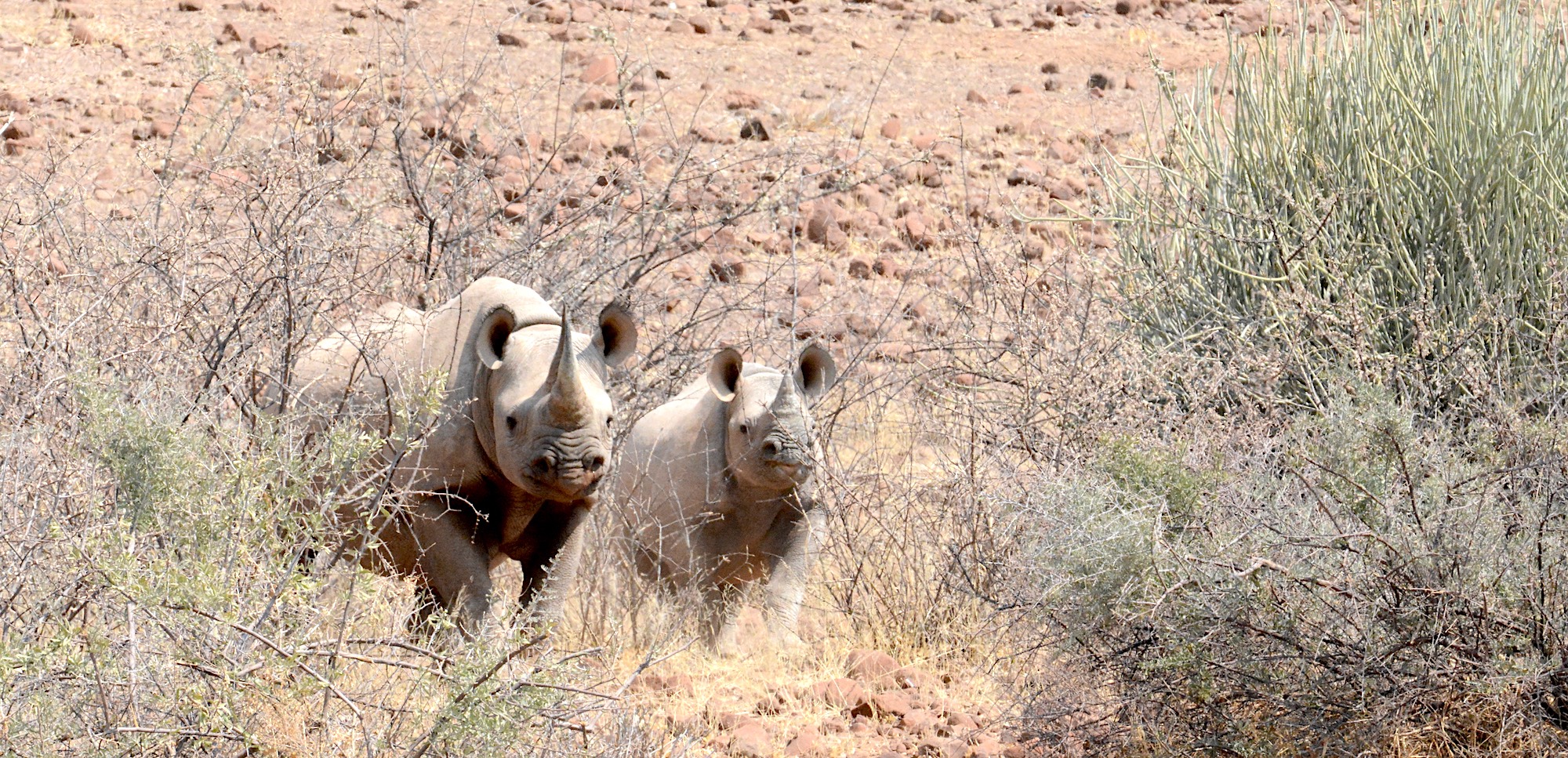
Besides enacting these tough new laws, prosecutors, magistrates, and judges are now more aware of how these crimes may be linked to other serious crime (e.g. drug and human trafficking). The on-going awareness workshops with legal professionals will ensure that suspects are charged using as many different pieces of legislation as possible, and will thus feel the full force of Namibian law. The result of this work was demonstrated by recent statements made by Magistrate Clara Mwilima when she sentenced a Namibian citizen caught in possession of ivory – after handing down a N$ 50,000 fine (or five years in prison), she stressed the seriousness of wildlife crime as a threat to protected species, ecosystems and the economy. The convicted person's vehicle was also declared forfeited to the state.
Beyond these new strides in the right direction, the Namibian investigative and anti-poaching teams recognise the need to reach out to neighbouring countries. As a thin strip of Namibian land between Botswana and Zambia, the Zambezi Region is especially vulnerable to trafficking wildlife products, because poachers who have killed an elephant in one country can quickly hop across the border with their ivory into the next country. Consequently, our teams are working closely with their Zambian and Batswana colleagues to ensure that poachers trying to use the Zambezi as a corridor are stopped in their tracks.
The Zambezi Region is part of the Kavango-Zambezi Transfrontier Conservation Area (KAZA), which provides a platform for information exchange among the governments and other organisations in Namibia, Angola, Botswana, Zambia and Zimbabwe. KAZA has the largest remaining population of elephants in Africa, so stopping ivory poaching in this region is of global significance. In February 2019 Namibia hosted a workshop funded by USAID for judges, magistrates and senior prosecutors from all five KAZA countries to spread the message about the importance of successful prosecutions and tough sentences for wildlife crime. MET and NAMPOL featured strongly in this workshop, as they demonstrated their search and seizure procedures for the attendees.
The final weapon that Namibia is employing to combat wildlife crime is all too often overlooked. Yet this particular weapon has enormous potential: it can be the game changer that finally sends the crime syndicates packing. That weapon is the average Namibian citizen. This is the ‘man on the street’, or the equivalent in our rural areas – those living on farms or in villages. A criminal can hide from police or anti-poaching units in uniforms, as they are easily identifiable. What will really give him sleepless nights, however, is when ordinary Namibians he encounters, and even those he does not see or notice, represent the eyes and ears of the law.
The Namibian strategy is based on the simple recognition that Namibia’s natural resources ultimately belong to Namibian citizens. By recognising this right through the conservancy system, the government has included its citizens as joint managers and owners of wildlife. This means that when a foreigner comes to Namibia to kill rhinos, elephants or pangolins he is not just stealing from the government, but from the people of Namibia. As Namibians living on communal or freehold land benefit from wildlife, they make this logical connection and are motivated to blow the whistle on poachers.
Namibia is making great progress in combating wildlife crime using its full array of strategic weapons, but the war is far from over. Our investigative procedures and legal system must align even further to counteract the changing strategies of poaching and trafficking syndicates who are quick to respond to Namibia's adaptive law enforcement approaches. There is every reason to have confidence in Namibia's commitment and integrated strategy to fight and prosecute wildlife crime. Finally, every Namibian citizen needs to become fully aware of the severity of wildlife crime, so that we use our incredible collective power to help the authorities crack down on those who would dare to steal from us.
Rhino Poachers Caught Due to Tip-off From //Huab Conservancy Member
The //Huab Conservancy in the Kunene Region is home to some of Namibia’s free-ranging black rhino, but until recently the conservancy has struggled to generate income from its wildlife. Due to its largely inaccessible location off the main tourism route in southern Kunene, //Huab’s members have reaped few benefits from their wildlife in the past. This changed when Ultimate Safaris established a lodge in the conservancy in 2016 and developed a unique rhino tracking tourism product that employs conservancy rhino rangers to monitor the rhinos and allows guests to view them unobtrusively. Ultimate Safaris is thus demonstrating the tangible value of rhinos to local people.
During June 2017 a member of the //Huab Conservancy noticed some suspicious activity on the road north of Khorixas while herding livestock. Knowing that these people might be on the way to kill one of the black rhinos, he alerted the local authorities. This tip-off led to the rapid deployment of police and MET rangers to the area, where they found the suspects and arrested them. They were armed and clearly prepared for poaching activities. The driver who dropped them off in the area, and was to collect them later, was lured back to the area, resulting in the arrest of the driver and the impoundment of the vehicle. This was enough evidence to open a court case against them. Criminal syndicates will find it increasingly difficult to operate in areas where the local people understand the value of their wildlife and know what to do when they spot suspicious activities.
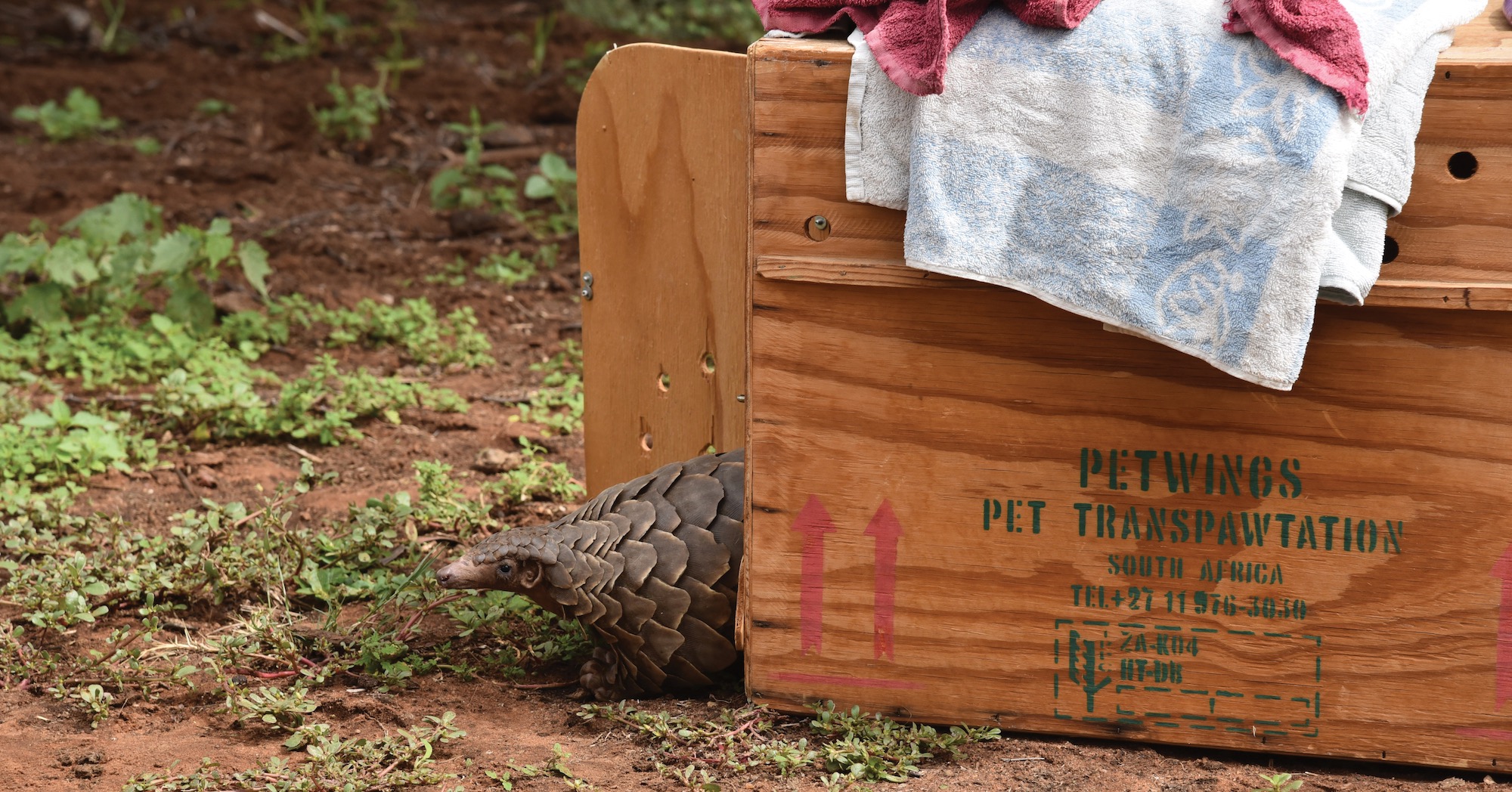
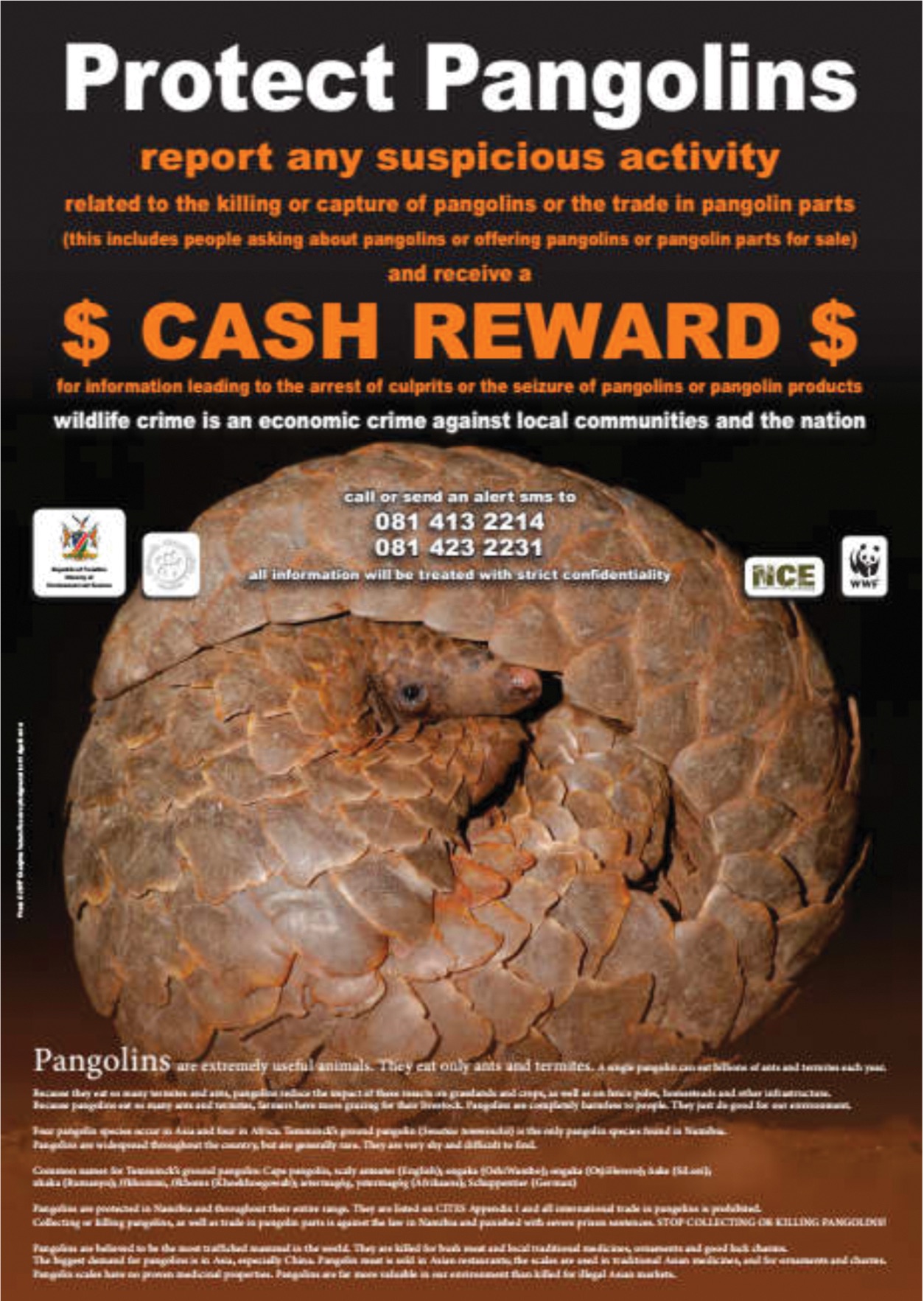
A Successful Reward Scheme Clamps Down on Pangolin Trafficking
Bringing Namibian citizens on board to fight wildlife crime involves increasing their awareness of the problem and providing suitable incentives for them to act. While the crimes against rhinos and elephants are well known, and their value to the country has been well publicised, the pangolin has historically received less attention than it deserves. Pangolins are the most trafficked animal in the world, and this illegal international trade started affecting Namibia in early 2017 as cases of pangolin trafficking increased to unprecedented levels.
To counter this new threat, the Ministry of Environment and Tourism joined the Namibian Chamber of Environment and other partners to set up a reward scheme to incentivise Namibians to report pangolin trafficking. Cash rewards are offered for information leading to the arrest of poachers, and the reward amount is increased if the informant is willing to testify in court. Since its inception in late 2017 up to January 2019 this scheme has led to 75 criminal cases being opened, 139 arrests, and the rescue and rehabilitation of 45 live pangolins. This shows what can be achieved when we invite ordinary citizens to participate in the war against wildlife crime.
Watch this:
For articles on similar topics, please click one of the following options:
If you enjoyed this page, then you might also like:
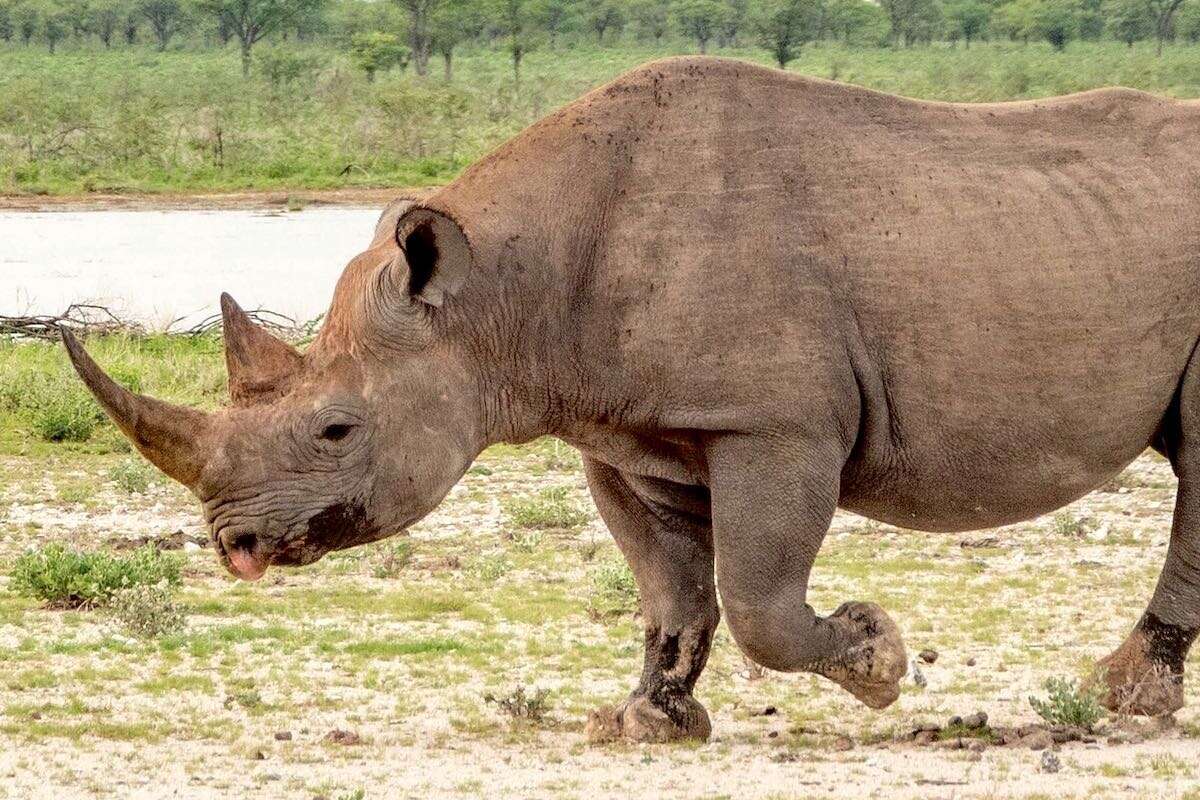
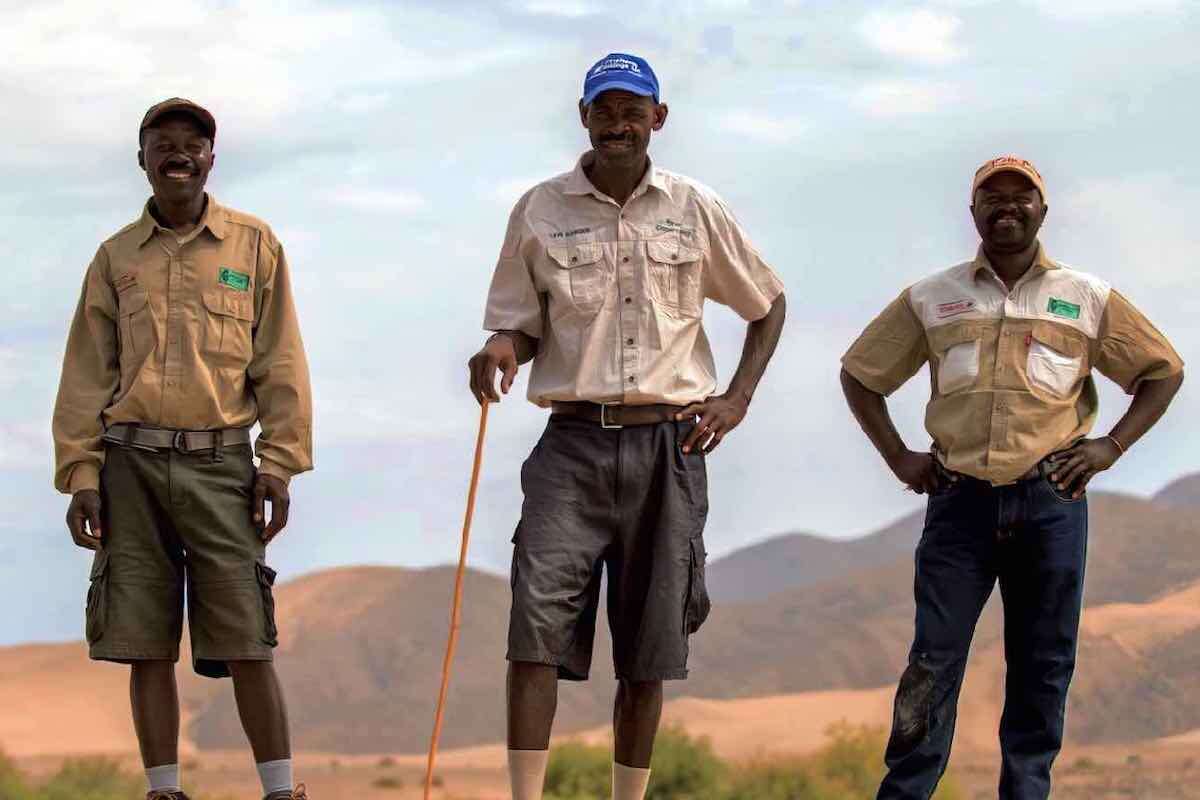

For more great articles from Conservation Namibia see below...
Conservation Namibia brought to you by:
We use cookies to monitor site usage and to help improve it. See our Privacy Policy for details. By continuing to use the site, you acknowledge acceptance of our policy.
